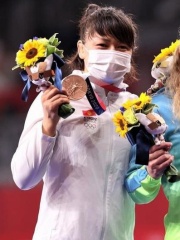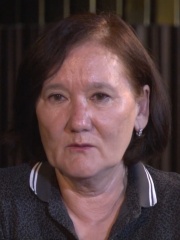




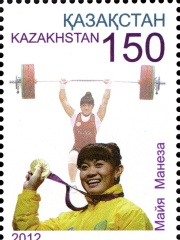
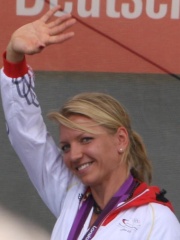
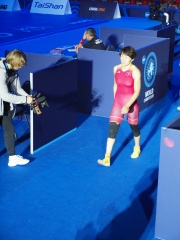
The Most Famous
ATHLETES from Kyrgyzstan
This page contains a list of the greatest Kirghiz Athletes. The pantheon dataset contains 6,025 Athletes, 24 of which were born in Kyrgyzstan. This makes Kyrgyzstan the birth place of the 74th most number of Athletes behind Venezuela, and Peru.
Top 10
The following people are considered by Pantheon to be the top 10 most legendary Kirghiz Athletes of all time. This list of famous Kirghiz Athletes is sorted by HPI (Historical Popularity Index), a metric that aggregates information on a biography's online popularity. Visit the rankings page to view the entire list of Kirghiz Athletes.

1. Mariya Pinigina (b. 1958)
With an HPI of 52.18, Mariya Pinigina is the most famous Kirghiz Athlete. Her biography has been translated into 24 different languages on wikipedia.
Mariya Dzhumabaevna Pinigina (Мария Джумабаевна Пинигина, née Kulchunova; born 9 February 1958 in Ivanovka, Kyrgyz SSR) is a former Olympic athlete who competed mainly in the 400 metres, training at Spartak in Kyiv. She represented the Soviet Union. Pinigina competed for USSR in the 1988 Summer Olympics held in Seoul, South Korea in the 4 × 400 metres where she won the gold medal with her teammates 400 m hurdles silver medalist Tatyana Ledovskaya, 400 m bronze medalist Olga Nazarova and olympic 400 m champion Olga Bryzgina. That USSR relay team set a new world record of 3:15.17 minutes which is still unbeaten. She also won a bronze medal at the 1983 World Championships in Athletics. In November 2013, she served as one of the torch bearers in Yakutsk for the 2014 Winter Olympics torch relay. Mariya Pinigina is married to Olympic wrestling champion Pavel Pinigin.

2. Satymkul Dzhumanazarov (1951 - 2007)
With an HPI of 51.18, Satymkul Dzhumanazarov is the 2nd most famous Kirghiz Athlete. His biography has been translated into 15 different languages.
Satymkul Dzhumanazarov (Russian: Сатымкул Джуманазаров; 17 September 1951 – 2 April 2007) was a Soviet athlete from Kyrgyzstan who competed mainly in the marathon. He competed for the USSR at the 1980 Summer Olympics held in Moscow, Soviet Union, where he won the bronze medal in the men's marathon. He came fifth at the 1981 Tokyo Marathon with a time of 2:12:31 hours.

3. Igor Paklin (b. 1963)
With an HPI of 50.85, Igor Paklin is the 3rd most famous Kirghiz Athlete. His biography has been translated into 18 different languages.
Igor Vasilyevich Paklin (Russian: Игорь Васильевич Паклин; born 15 June 1963 in Frunze, Kirghiz SSR) is a retired Soviet Kyrgyz athlete who represented USSR and later Kyrgyzstan. He trained at Armed Forces sports society in Frunze. Competing in the high jump, he won the 1987 World Indoor Championships as well as a silver medal at the 1987 World Championships for the USSR. His personal best jump of 2.41 metres (7.9 feet) was also the world record from 4 September 1985 to 30 June 1987, when Patrik Sjöberg beat it by one centimetre. His leap of 2.41 m (7 ft 11 in) places him as the fifth-highest jumper in history. Like all modern high jumpers, Paklin used the Fosbury Flop style, and he was the first to do so jumping off his right leg. In 1995, he was imprisoned for manslaughter.

4. Tatyana Kolpakova (b. 1959)
With an HPI of 49.57, Tatyana Kolpakova is the 4th most famous Kirghiz Athlete. Her biography has been translated into 21 different languages.
Tatyana Alekseyevna Kolpakova (married Abbyasova) (Russian: Татьяна Алексеевна Колпакова (Аббясова)) (born October 18, 1959 in village Alamedin, Kyrgyz SSR) is a retired long jumper who represented the USSR. Kolpakova began athletics at the age of 15. On May 9, 1974 she competed at the All-Union junior competition on the Central Lenin Stadium and was second with a result of 5.90 metres. In the same year she entered Economical faculty of Kirghiz University in Frunze, which she left after three years of study. Later Kolpakova graduated from the Physical faculty of the same university. In 1978 she passed a test for the Master of Sports of the USSR title with a result of 6.30 metres, competing at the All-Union Jumper's Day competition in Chişinău. She joined the USSR team in 1979 and competed for it at the 1980 Summer Olympics in Moscow. In what is considered one of the greatest come from behind victories in the history of the sport, Kolpakova won the gold medal with her last jump of 7.06 metres which improved her personal best by nine inches and was a new record for the sport. She later remarked that "one should always fight until the end." She became the Honoured Master of Sports of the USSR. After finishing her competitive career Kolpakova worked for some time as a coach. She was awarded the title of Kirghiz Athlete of the Century. Soon after, a track and field championship was established in Bishkek in her honor. The championship is held annually in Bishkek, usually in May, and participants from surrounding countries are invited. In 2001, Kolpakova moved to Moscow, Russia with her family. The first few years she worked as a director of an athletic club there. In 2004, she began her work at the Olympic Committee for Physical Culture, Sports and Tourism in Korolev City. She is still currently working there, as second in command. She is married to Shamil Abbyasov (whom she met on the same USSR national team) and has three children.

5. Nikolay Chernetskiy (b. 1959)
With an HPI of 45.90, Nikolay Chernetskiy is the 5th most famous Kirghiz Athlete. His biography has been translated into 16 different languages.
Nikolay Nikolayevich Chernetskiy (Russian: Николай Николаевич Чернецкий; born 29 November 1959 in Frunze, Kirghiz SSR) is a retired track and field sprinter from the Soviet Union. He is known for winning the gold medal in the men's 4 × 400 metres relay at the 1980 Summer Olympics and at the inaugural 1983 World Championships (with Aleksandr Troshchilo, Sergey Lovachov, and Viktor Markin, clocking a total time of 3:00.79 min).

6. Ryan Murphy (b. 0)
With an HPI of 44.18, Ryan Murphy is the 6th most famous Kirghiz Athlete. Their biography has been translated into 11 different languages.
Ryan Murphy may refer to:

7. Maiya Maneza (b. 1985)
With an HPI of 40.52, Maiya Maneza is the 7th most famous Kirghiz Athlete. Her biography has been translated into 15 different languages.
Maiya Salakharqyzy Maneza (Kazakh: Майя Салахарқызы Манеза; Russian: Майя Салахаровна Манеза; born 1 November 1985) is a Kazakhstani weightlifter. She initially won the gold medal at the 2012 Summer Olympics in the 63 kg category by lifting a combined weight of 245 kg and set a new Olympic record in the process. She was later stripped of her Olympic medal after a failed drug test.

8. Lilli Schwarzkopf (b. 1983)
With an HPI of 40.30, Lilli Schwarzkopf is the 8th most famous Kirghiz Athlete. Her biography has been translated into 21 different languages.
Lilli Schwarzkopf (born 28 August 1983 in Novopokrovka, Kirghiz SSR) is a German heptathlete. Her first major global competition was the 2005 World Championships in Athletics, where she finished in 13th place. She won the bronze medal at the 2006 European Athletics Championships in Gothenburg. She followed this up on the world stage with a fifth-place finish at the 2007 World Championships and eighth place at the 2008 Summer Olympics. She failed to finish the heptathlon at the 2009 World Championships in Athletics in Berlin and chose to omit the 2010 European Athletics Championships to focus on her studies but came back to place sixth at the 2011 World Championships in Daegu. Schwarzkopf won the silver medal in the heptathlon at the 2012 Summer Olympics. Initially after the 800 metres, Schwarzkopf was disqualified for breaking lane, but this later turned out to be a mistake, Kristina Savitskaya in the neighbouring lane having done so, and Schwarzkopf was re-instated.

9. Aisuluu Tynybekova (b. 1993)
With an HPI of 39.62, Aisuluu Tynybekova is the 9th most famous Kirghiz Athlete. Her biography has been translated into 24 different languages.
Aisuluu Tynybekova (Kyrgyz: Айсулуу Тыныбекова, born 4 May 1993 in Bishkek) is a Kyrgyz freestyle wrestler. She won the silver medal in the women's 62 kg event at the 2020 Summer Olympics held in Tokyo, Japan. She also competed in the women's 63 kg event at the 2012 Summer Olympics, the first woman to wrestle for Kyrgyzstan in the Olympics. A legal dispute threatened to prevent Tynybekova from competing in London, but the case was delayed until after the Games. Tynybekova was eliminated in the 1/8 finals by Henna Johansson. As of summer 2016, Tynybekova has competed in four World Championships (her highest finish being seventh in 2013) and four Asian Championships, finishing no lower than third and winning the 58 kg class in 2016. In the 2016 Summer Olympics, Tynybekova won her octofinal and quarterfinal, then lost her semifinal to the eventual silver medalist, Russia's Valeria Koblova. She then lost the second bronze medal match to Sakshi Malik of India (see Wrestling at the 2016 Summer Olympics–Women's freestyle 58 kg). On 13 May 2017, Tynybekova received a gold medal in the Asian championship in 2017 (New Delhi, India). On 23 August 2017, she received a bronze medal at the 2017 World Championships in Paris, France, by defeating Ms. Rong Ningning (China) in 58 kg wrestling. In 2020, she won the gold medal in the 62 kg event at the 2020 Individual Wrestling World Cup held in Belgrade, Serbia.

10. Alexander Kosenkow (b. 1977)
With an HPI of 37.99, Alexander Kosenkow is the 10th most famous Kirghiz Athlete. His biography has been translated into 14 different languages.
Alexander Kosenkow (Russian: Александр Косенков; born 14 March 1977) is a German sprinter who specialises in the 100 metres. He represents the sports club TV Wattenscheid.
People
Pantheon has 24 people classified as Kirghiz athletes born between 1951 and 2000. Of these 24, 23 (95.83%) of them are still alive today. The most famous living Kirghiz athletes include Mariya Pinigina, Igor Paklin, and Tatyana Kolpakova. The most famous deceased Kirghiz athletes include Satymkul Dzhumanazarov. As of April 2024, 2 new Kirghiz athletes have been added to Pantheon including Alexander Kosenkow, and Izzat Artykov.
Living Kirghiz Athletes
Go to all RankingsMariya Pinigina
1958 - Present
HPI: 52.18
Igor Paklin
1963 - Present
HPI: 50.85
Tatyana Kolpakova
1959 - Present
HPI: 49.57
Nikolay Chernetskiy
1959 - Present
HPI: 45.90
Ryan Murphy
HPI: 44.18
Maiya Maneza
1985 - Present
HPI: 40.52
Lilli Schwarzkopf
1983 - Present
HPI: 40.30
Aisuluu Tynybekova
1993 - Present
HPI: 39.62
Alexander Kosenkow
1977 - Present
HPI: 37.99
Zholaman Sharshenbekov
1999 - Present
HPI: 35.93
Meerim Zhumanazarova
1999 - Present
HPI: 35.44
Izzat Artykov
1993 - Present
HPI: 34.44


